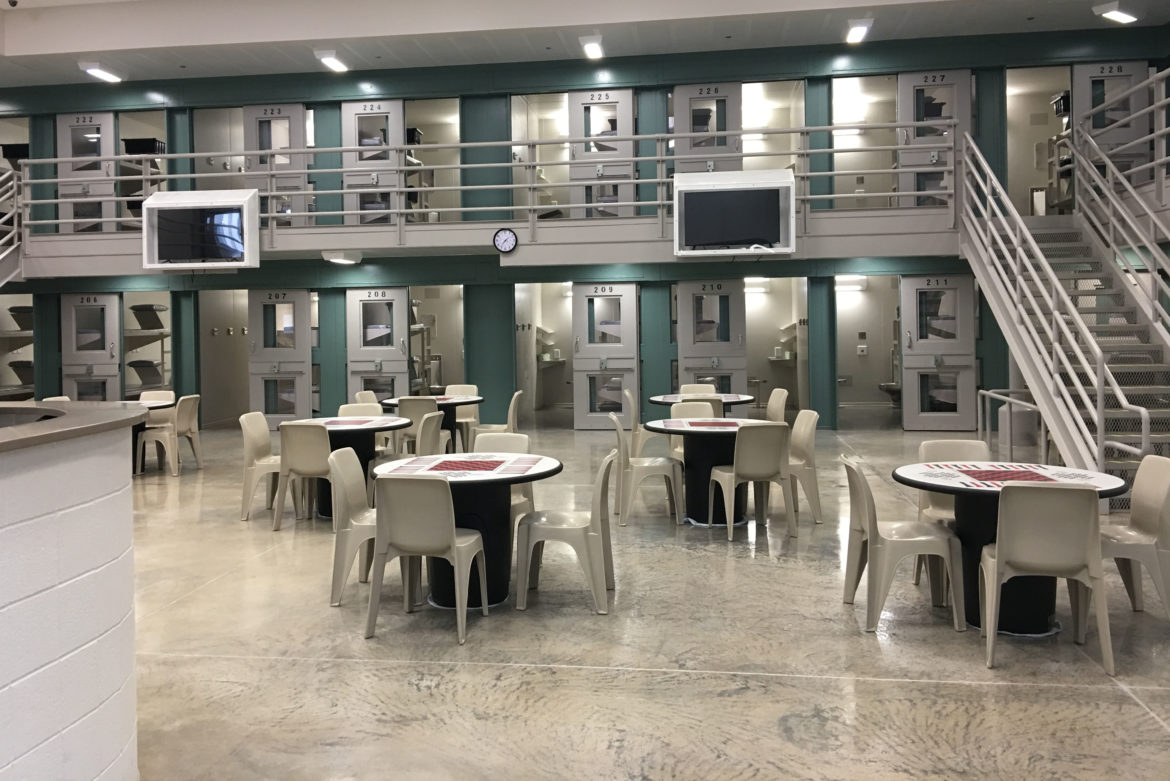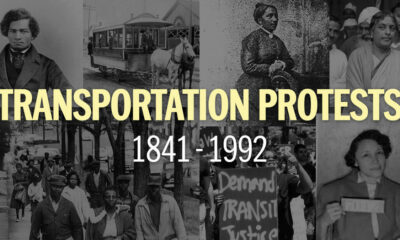Mississippi News
Mississippi parole rates lower – Mississippi Today

A year later, parole rates lower than before law went into effect
One year after a law expanded parole eligibility to more people incarcerated in Mississippi prisons, the state’s parole grant rate has declined by more than a third, a sign criminal justice reform advocates say shows the law isn’t being fully implemented.
Senate Bill 2795, known as the Mississippi Earned Parole Eligibility Act, became law in July 2021 with the goal of giving more people the opportunity to be heard by the Mississippi Parole Board and potentially be released from prison. As a result, about 5,700 additional people are expected to become parole eligible within the next five years, according to an estimate in the Corrections and Criminal Justice Oversight Task Force’s January report.
FWD.us, a criminal justice and immigration reform group, supported SB 2795. Once the law was implemented, results were encouraging; the parole grant rate climbed and the prison population rate declined to its lowest point in more than 20 years, the group said.
By November 2021, the parole grant rate reached a high of 93% and the board held over 1,000 parole hearings, according to numbers from the Mississippi Department of Corrections obtained by Mississippi Today. But soon after, parole rates and hearings began dropping each month. In July 2022, the most recent data available, the grant rate was 40% and the board held 633 hearings.
!function(){“use strict”;window.addEventListener(“message”,(function(e){if(void 0!==e.data[“datawrapper-height”]){var t=document.querySelectorAll(“iframe”);for(var a in e.data[“datawrapper-height”])for(var r=0;r<t.length;r++){if(t[r].contentWindow===e.source)t[r].style.height=e.data["datawrapper-height"][a]+"px"}}}))}();
“Parole grant rates have fallen by more than half, reducing the incentives of people in Mississippi’s prisons to participate in programs and prepare to safely reenter society,” FWD.us State Director Alesha Judkins said in a statement to Mississippi Today.
Judkins said parole is an evidence-based policy that gives people second chances, reunites them with their families and community and curbs taxpayer spending. It is also a way to address Mississippi’s long prison sentences.
Parole Board Chair Jeffery Belk stepped into his role at the beginning of the year, around the time the board was coming down from working through a wave of hearings spurred by parole eligibility expansion taking effect.
He said the board is aware that since he’s become chairman, the parole grant rate has fallen. Belk said the numbers don’t dictate decisions, and the board looks at a range of available information to decide whether to grant parole.
“I would rather have the numbers be true and accurate and go back and look at them then just ‘we did whatever we did to get the numbers down’ mentality,” he said during an interview with Missisisppi Today.
When writing the law, Belk said legislators had faith that the Parole Board would review and determine who would receive parole and who wouldn’t.
Generally, a person can become eligible for parole after serving a certain amount of time on their sentence and having been convicted of a crime that is parole eligible.
Under SB 2795, those convicted of nonviolent crimes and non habitual drug offenses committed after June 30, 1995 must serve either 25% of their sentence or 10 years before becoming parole eligible.
Those who committed a violent crime must serve half their sentence or 20 years, and people convicted of robbery with a deadly weapon, a drive-by shooting or carjacking must serve 60% of their sentence or 25 years.
People who have reached the age of 60 and served at least 10 years of their sentence for a parole-eligible crime can also receive it.
Capital offenses, murder, drug trafficking, sex crimes and being a habitual offender are among the crimes in the state that are not eligible for parole.
When Gov. Tate Reeves signed the Mississippi Earned Parole Eligibility Act in April 2021, he called it “a measured approach to (second) chances” and said it would be a “net positive for (Mississippi)” with proper implementation.
Under SB 2795, a parole hearing date shall be set when a person is within 30 days of their parole eligibility date.
Belk said there is a misunderstanding that a parole eligibility date means automatic release or sentence reduction. He said he often gets emails from family members of incarcerated people asking why they haven’t been released.
Newly-parole eligible people have had hearings, Belk said, but some may not be ready for release because they have not had access to programs such as skills and job training to succeed outside of prison.
If someone is not ready for parole, he said the board will give them time, maybe a year, to be reconsidered.
“Now that they’re parole eligible, just because they missed their first parole eligibility date, doesn’t mean they’re going to miss their next one if they start taking advantage of (programs),” Belk said.
In an Aug. 17 interview with Supertalk Radio, MDOC Commissioner Burl Cain said he asked the parole board not to approve parole for gang members to protect public safety and to send a message that gang membership in prison won’t help.
“So that kind of makes the (prison) numbers spike up, but it’s public safety and that’s what we’re all about,” he said.
In response, Belk reiterated that the Parole Board has shifted from a numbers-driven perspective and takes time to make tough decisions about parole, including for those who are gang members.
While parole hearings have decreased, Belk said there has been a related wave of hearings to determine whether someone should have their parole revoked. A revocation may happen if a person commits a new crime or fails to report to a parole officer for a certain period of time.
Belk said the board will give the person a chance to clear up any issues to be able to continue on parole. Otherwise, the person will be returned to prison.
As the parole rate has fallen, the state is seeing its prison population increase. Mississippi is a world leader in incarceration. The prison population has grown and is higher than last year when parole eligibility expansion became law, according to MDOC records.
Judkins, of FWD.us, said less opportunities for parole and a growing prison population don’t just hurt people who are incarcerated. Those situations also don’t improve public safety and can cost taxpayers more.
“Unfortunately, the rapidly declining parole grant rate is not only blunting the impact of the new law but also denying meaningful opportunities for release to those who were parole eligible before the new law,” she said.
This article first appeared on Mississippi Today and is republished here under a Creative Commons license.
Mississippi News
Events happening this weekend in Mississippi: April 18-20

SUMMARY: This weekend (April 18-20), Mississippi offers a variety of events for all ages. In Jackson, enjoy Food Truck Friday, a jazz concert, free outdoor movie screenings, and multiple exhibitions including “Of Salt and Spirit” and “Hurricane Katrina: Mississippi Remembers.” For family fun, there’s an Easter Egg Hunt at the Ag Museum and “Bunnies & Butterflies” at MCM. Natchez features the Spring Pilgrimage, Lafayette’s 200th anniversary celebration, and a farmers market. In the Pine Belt, highlights include Live at Five, a Spring Candle-Making Workshop, and Easter events at the Hattiesburg Zoo. Don’t miss the Bluff City Block Party and more!
The post Events happening this weekend in Mississippi: April 18-20 appeared first on www.wjtv.com
Mississippi News
Events happening this weekend in Mississippi: April 11-13

SUMMARY: This weekend in Mississippi (April 11-13), enjoy a variety of events across the state. Highlights include the Eudora Welty Birthday Bash in Jackson, Trivia Night at the Mississippi Museum of Natural Science, and Boots & Bling Fundraiser in Natchez. For family fun, check out the Bunny Bonanza in Jackson or the Easter Egg Hunt in Clinton. The Natchez Concours d’Elegance Car Show and Stranger Than Fiction Film Festival offer cultural experiences, while the 12th Annual Dragon Boat Regatta in Ridgeland and the Hub City Classic Car Show in Hattiesburg provide exciting activities for all ages.
The post Events happening this weekend in Mississippi: April 11-13 appeared first on www.wjtv.com
Mississippi News
Ole Miss women get pair of double-doubles and roll to 83-65 March Madness win over Ball State

SUMMARY: Mississippi coach Yolett McPhee-McCuin found solace in returning to a different arena in Waco, Texas, following a disappointing previous tournament experience. The No. 5 seed Ole Miss Rebels redeemed themselves with an 83-65 victory over 12th-seeded Ball State in the NCAA Tournament’s first round. Starr Jacobs led the Rebels with 18 points and 11 rebounds, while Kennedy Todd-Williams and Madison Scott each scored 15 points. Ole Miss dominated rebounding, leading 52-32, and will face fourth-seeded Baylor next. Coach McPhee-McCuin noted the team’s evolution since their last visit and the significance of playing in Texas, where Jacobs feels at home.
The post Ole Miss women get pair of double-doubles and roll to 83-65 March Madness win over Ball State appeared first on www.wjtv.com
-

 Mississippi Today6 days ago
Mississippi Today6 days agoLawmakers used to fail passing a budget over policy disagreement. This year, they failed over childish bickering.
-

 Mississippi Today6 days ago
Mississippi Today6 days agoOn this day in 1873, La. courthouse scene of racial carnage
-

 Local News6 days ago
Local News6 days agoSouthern Miss Professor Inducted into U.S. Hydrographer Hall of Fame
-

 News from the South - Alabama News Feed5 days ago
News from the South - Alabama News Feed5 days agoFoley man wins Race to the Finish as Kyle Larson gets first win of 2025 Xfinity Series at Bristol
-

 News from the South - Alabama News Feed5 days ago
News from the South - Alabama News Feed5 days agoFederal appeals court upholds ruling against Alabama panhandling laws
-

 News from the South - Florida News Feed7 days ago
News from the South - Florida News Feed7 days agoSevere weather has come and gone for Central Florida, but the rain went with it
-

 News from the South - Alabama News Feed7 days ago
News from the South - Alabama News Feed7 days agoBellingrath Gardens previews its first Chinese Lantern Festival
-

 News from the South - Texas News Feed6 days ago
News from the South - Texas News Feed6 days ago1 dead after 7 people shot during large gathering at Crosby gas station, HCSO says















































